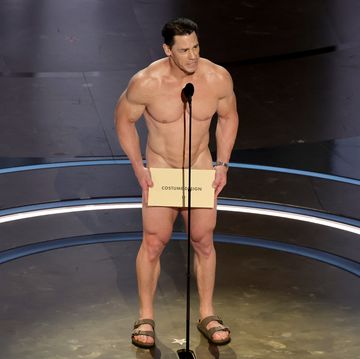*MASSIVE SPOILERS AHEAD*
There's one particular scene in Alien: Covenant that stands out above all others, and it's one that nearly didn't make the cut. Michael Fassbender's David stands above the home planet of the Engineers, Prometheus's much-mocked big bald bad guys, the sentient Synthetic staring down disapprovingly from the open undercarriage of his circling ship.
With disgust he drops the previous film's payload of mysterious killer black gloop onto the enormous crowd below, the camera cutting back to a vast, "final battle in Lord of the Rings"-style landscape of infected Engineers writhing to their deaths in hideous pain in and around their suitably alien architecture. We later find out it wiped out the entire planet.
It's the only time we see the Engineers in the film. It feels like an exorcism.
Intriguingly, Sir Ridley Scott told us the studio didn't want that stirring scene in the film, preferring for it to be communicated casually in conversation. Sir Ridley insisted. The Engineers were dying on camera.
You even half expect Fassbender to turn to the screen after, give a thumbs up and wink: "That one's for you, guys."
The 2012 Alien prequel Prometheus remains such a divisive movie, though one this writer has a lot of time for when it's not insisting that people run in straight lines and take their helmets off at questionable times. (The latter is a common-sense affliction shared by the Covenant crew, alas.)
It was never intended to be an Alien film proper, the studio insisted, just to exist in the same world with a bit of fan-service thrown in. Yet the reaction to just the hint of Xenomorph pulled the series back, kicking and screaming, to the franchise that bore it.
After all, the original 'Alien: Engineers' script by John Spaihts for Prometheus, before Lost's Damon Lindelof was let loose on it, basically tells the same story but concludes on original Alien moon LV 426 and features Xenomorphs aplenty – aspects that were actively removed.
Fox even threw tonnes of money at FX expert ILM to come up with a fantastic Xeno-tastic transformation for Sean "I like rocks" Fifield, then dumped it in the 'deleted scenes' folder for the far inferior version we got that shifted his fate from obvious sub-alien evolution to a zombie gorilla.
The Alien franchise, after so many 'Alien vs Predator' spin-offs, was clearly considered dirty – he was considered "cooked", as Scott now admits – but because of all this behind-the-scenes fiddling, Prometheus ended up making more money than it made sense. Going by audience feedback, if the studio was going to make more money – and, by God, they were – it wouldn't be with a Prometheus 2.
Alien: Covenant is quite obviously the direct result of that feedback – for good and for bad. "You want a proper Alien movie?" Scott appears to be saying. "Here you go, knock yourself out."
So while Covenant follows directly on from Prometheus on the Peter Weyland-financed Magical Mystery Tour timeline, it quickly tries to put as much distance between the two movies as possible in terms of action, pace and tone. The way the soundtrack shifts between Prometheus's optimistic piano chords and the atmospheric dread of Jerry Goldsmith's original Alien score is almost like an aural recalibration.
Alien: Covenant is a tighter, more focused, more succinct film despite its identical running time and tendency to drift, the first half channeling the original Alien's stark contrast of tight interiors and space's expanse, the second more reminiscent of Alien 3's small-scale monasterial dread than Prometheus's almost Star Trek-like space opera.
Yet while this establishes tension earlier (between a coherent group of more likeable and marginally less stupid space-farers), it does so by reducing the formula down to the fundamentals rather than risk too much. It's sci-fi horror comfort food.
In fact, it's hard to get past the feeling that the film has been entirely focus-grouped on Prometheus's prevailing public opinion.
Covenant turns up the dial on what people generally liked – Fassbender ("Give 'em two of him!"), pretty Icelandic landscapes, people dying – bins off what they generally didn't – there go the Engineers and Noomi Rapace – and then injects what everyone thought was missing: Xenomorphs, chest-bursting, alien eggs, a young Guy Pearce, and Ripley-not-Ripley.
If the original Alien was the no-nonsense punk-rock debut and Prometheus was the sprawling Be Here Now mess of excess, Covenant is the dependable factory-line hit. A risk-free popcorn crowd pleaser like Force Awakens that manages to intermittently thrill even though its surprises are dulled by familiarity.
Yet while much of Alien: Covenant appears to be an apology for Prometheus, a checklist of tick boxes on a correction form to be More Like Alien, it's actually the predecessor's ideas that remain most interesting. Scott and co may well be making up the Xenomorphic Cinematic Universe as they go along now, grafting new ideas onto old and hoping they take, but it's sure making for compelling lore.
A CGI alien stalking and dismembering pretty people like a slasher-film antagonist is all well and good, but Covenant is at its best when it's giving Prometheus's untied knots a good waggle, provoking mental leaps to where the series could be heading, whether that's in the flashback Weyland prologue, the Elisabeth Shaw Alien Queen suggestions (is Aliens still lore?) or David's best Dr Moreau-cum-Colonel Kurtz-cum-Rhys Ifans impression that brings the Xenomorphs to pass.
Regardless, the seeds sown in Prometheus and cultivated in Covenant – "Big things have small beginnings," as David said in the former, quoting his favourite Lawrence of Arabia – are building some kind on on-the-hoof consistency. It will now be felt the next time you watch any of the original Alien films, or perhaps the upcoming, increasingly connected Blade Runner 2049, in the same way Rogue One: A Star Wars Story directly impacts A New Hope.
Even if much of the dialogue and what the characters actually did sometimes made little sense in Prometheus, the larger ideas and changes to the world in which they existed did, and the 40 years left to cover between Covenant and the original Alien are now ripe with possibility for exploring and exploiting.
Which is why we hope that David's symbolic massacre is not the last we see of the Engineers, that earth's enigmatic supposed creators are not reduced to narrative litter to be discarded on the side of the road that is increasingly David's story.
The one hope is that if there's going to be a proper Rogue One-style baton hand-off at some point, we'll at least need one Engineer to waddle back on, stage right, to slip into his comfy Space Jockey chair on LV 426, just in time to be entered and exited by a killer Xenomorph.
By then, however many films it's taken to get us there, maybe we'll even finally know why.















